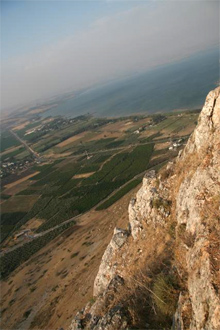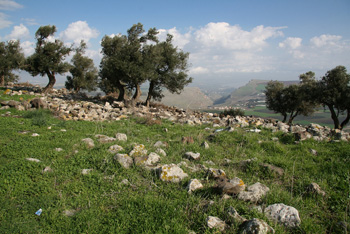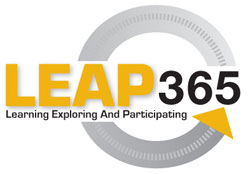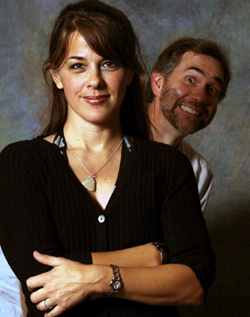by Laura Lehman Amstutz
Eastern Mennonite Seminary is experimenting with different ways of expanding the learning process.
 During the spring semester, six students and one professor tested the limits of online and in-person education with a “hybrid” course called “The Jesus Movement in the Early Context.”
During the spring semester, six students and one professor tested the limits of online and in-person education with a “hybrid” course called “The Jesus Movement in the Early Context.”
The students were all service workers living in various locations in Israel/Palestine. The major component of the course was a research project based on their interests and work in these regions of protracted conflict.
For example, Becki I. Day from Lancaster, Pa., is a volunteer at Nazareth Village, a re-creation of the town as it would have appeared in the time of Jesus. She spends her days herding sheep for the Village. She chose to research sheep and shepherding in the first century as her project.
“I gained new insights into Jesus’ view of shepherds and the importance of shepherds in the Bible,” Day said.
“It was great to study things that are relevant to where I am living and relate directly to my work,” she added.
David P. Landis from Harleysville, Pa., spent his time developing and promoting the Jesus trail, a new hiking trail intended to re-create the routes Jesus would have walked in Galilee.
“I took this course because it strengthened the work I was doing with the Jesus Trail,” said Landis. “The course provided historical and theological context to the impetus behind Jesus’ travel.”
“The students were the most enthused, passionate, well informed and engaged of any students I have ever related to,” said Linford L. Stutzman, associate professor of culture and mission at EMS. “The students agreed that living in Israel made their research incomparably more engaging and rewarding to them personally and gave them insights they might otherwise have overlooked.”
The course incorporated a combination of online instruction, directed student research, intensive seminars on location and student teaching of others in Israel.
From January through March, students engaged in online discussion around research questions having to do with the context of Jesus’ ministry in the first century.
 “This course was unique in that the focus was not first of all on Jesus’ teaching, or even how people reacted to Jesus,” said Dr. Stutzman. “Rather, it was about how Jesus’ message affected people in light of how they lived and other features of their lives that aren’t part of the recorded biblical accounts.
“This course was unique in that the focus was not first of all on Jesus’ teaching, or even how people reacted to Jesus,” said Dr. Stutzman. “Rather, it was about how Jesus’ message affected people in light of how they lived and other features of their lives that aren’t part of the recorded biblical accounts.
“Because students worked independently on their research and chose topics that interested them and related to their personal experiences, there was a level of authenticity that doesn’t always happen when studying others living in distant times and places,” he continued.
“The most exciting part of the course for me was discovering parts of Jesus’ life that I never knew before, which made the life and teachings of Jesus so much more real and relevant for me,” said Tara Kreider from Harrisonburg, Va.
In April, the seminary students presented their research to an EMU undergraduate cross-cultural group Stutzman and his wife Janet were leading.
“The teaching component of this course was helpful in providing an avenue for us to share our research with others, offering a unique classroom that included the broader world in our learning,” said Landis.
“For me, the most exciting part of the course was sharing my research with a group of students by taking them on a hike on the Jesus trail for a day,” he said.
Anita L. Rhodes from Dayton, Va., studied food and hospitality and shared her research through a meal for the undergrad students.
“We had a full first-century meal complete with hosts, servants and even sharing the Lord’s Supper together,” said Rhodes. The meal was served on the floor, the room lit with oil lamps.
“The combination of first-hand experience in the land, research and teaching was definitely unique,” Rhodes continued. “I loved the fact that we got to put our new-found knowledge to use right away by teaching the undergraduate cross-cultural students.”
Eastern Mennonite Seminary is planning more courses like this with both an online and in-person component. In the summer of 2009, Stutzman will teach “The Christian Movement in the Mediterranean” that will involve students who are living and working at sites of the early church.

 The 2008 graduating class at
The 2008 graduating class at  by Laura Lehman Amstutz
by Laura Lehman Amstutz “Excellent Trouble: Finding the Humor and Heart in Biblical Relationships” will be performed at
“Excellent Trouble: Finding the Humor and Heart in Biblical Relationships” will be performed at